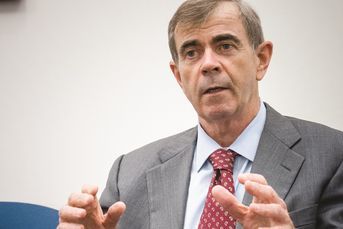Wirehouses escape the worst of the DOL fiduciary rule
The four large brokerages have emerged among the least affected by the heaviest regulation to hit the financial advice market in decades. (More: The DOL fiduciary rule covered from every angle)
While many financial advisory firms have hunkered down, unwilling to talk about the impact of the disruptive Labor Department fiduciary rule, the wirehouses have sought to reassure their shareholders that the sky is not about to fall.
Bank of America Corp.’s chief financial officer, Paul Donofrio, said during an earnings call last month that the Department of Labor’s new rule will affect less than 10% of the $2 trillion in assets at its wealth management business. During Morgan Stanley’s first-quarter earnings call, CEO James Gorman said of the DOL rule, “it’s not the be-all and end-all” for the bank’s brokerage business.
The wirehouses have good reason to minimize the impact of the rule, which requires financial advisers to put their clients’ interests ahead of their own when giving retirement advice. In the final version, the Labor Department threw the big broker-dealers a bone by allowing them to continue selling proprietary investment products in the retirement market.
KEEPING PERSPECTIVE
Even without the reversal on proprietary products, the wirehouses are probably better-positioned to weather the fiduciary storm than many of their counterparts, especially small, independent broker-dealers with limited resources. The cost of compliance — and even the ability to analyze the rule and figure out what they will have to do to comply — favors bigger firms with deep pockets.
Still, the main challenge of implementation lies ahead.
(More insight: Advisory firms now face the challenge of adapting to the fiduciary rule)
“They’re dealing with such a large pool of advisers,” said Danny Sarch, president of wealth management recruiting firm Leitner Sarch Consultants. “You got this extra liability that the firms haven’t put their arms around yet.”
The wirehouses — Morgan Stanley, Bank of America Merrill Lynch, Wells Fargo & Co. and UBS Group AG — have been combing through the lengthy, prescriptive regulation released April 6. It prompted a sweeping review of their business models and technology, including the supervision of the more than 50,000 advisers at the four firms combined.
“We are in the process of digesting the 1,000-plus pages of this rule and related exemptions,” Christine Jockle, a spokeswoman for Morgan Stanley, said in an emailed statement. “We have a year before the first stage of the rule goes into effect, which gives us time to determine the new policies and procedures we will implement to comply.”
The firm’s been preparing in part by making the necessary investments in technology, and it is setting up a fiduciary help desk for its advisers, the spokeswoman said last month.
REQUIRES STUDY
Rival Wells Fargo has created a team of experts to study the regulation, while reviewing current policies and procedures to consider any potential product, pricing and service delivery changes that might be required under various scenarios, according to spokeswoman Emily Acquisto.
Over time, Wells Fargo’s existing call center offering support for its advisers will be able to handle questions about the fiduciary rule, she said.


The ability to tap vast resources to adapt to the complex regulation may brighten the appeal of wirehouses, but it probably won’t convince many brokers with their own practice to give up their independence to join them, according to Ron Edde, president and CEO of recruitment firm Millennium Career Advisors.
This month, a trio of financial advisers managing about $350 million of assets at Harbor Lights Financial Group in Manasquan, N.J., left independent broker-dealer LPL Financial for Wells Fargo Advisors Financial Network, partly due to the protection that co-founding partner Doug Lockwood saw the firm providing in navigating the Labor Department’s new regulation.
“Even though they’re technically freestanding, they have a huge balance sheet,” Mr. Edde said of Wells Fargo’s independent brokerage arm. “They’ve stayed largely clear of widespread compliance issues.”
The DOL’s fiduciary rule is the biggest change to ripple through the retirement market since President Gerald Ford signed the Employee Retirement Income Security Act in 1974. Despite being watered down in the eleventh hour before its release, the DOL rule is nonetheless disruptive and there’s reason to be concerned.
(Related: How advisers expect the fiduciary rule will change the industry)
“It’s a new standard. It hasn’t been court-tested,” said Brian Kleinhanzl, a bank analyst at Keefe Bruyette & Woods Inc. It’s “about making sure that your processes are as airtight as possible upfront to reduce litigation risk,” he said.
BURDEN ON BROKERS
While the final version of the fiduciary rule allows firms to keep selling higher-commission proprietary investment products, brokers will have to demonstrate they’re in the best interests of their clients. They must be disclosed under the so-called best interest contract exemption.
It is there, in the fine print, where investors will be armed should a dispute proceed to litigation or arbitration.
“The biggest problem is going to be how they handle the supervision,” said Alma Angotti, a managing director in the global investigations and compliance practice at Navigant Consulting Inc.
$2.47 TWirehouses’ fee-based assets as of 2015Source: Aite Group research report
Wirehouses tend to work with wealthier, high-net-worth individuals with millions to invest. But even the ultra-wealthy tend to have a portion of their assets in individual retirement accounts to take advantage of tax-deferred savings.
That will require special attention as some advisers will be “following separate rules sitting in the same chair,” Ms. Angotti said. That’s because a broker providing advice tied to a retirement account will be subject to the best-interest rule, but at the same time will be free to sell investment products into a brokerage account, where a less stringent suitability standard will apply.
The rule could also change how compensation is structured as bonuses and other incentives to push high-cost proprietary products may be called into question, according to Ms. Angotti.
Wirehouses have been scaling back proprietary products since the early 2000s because of the scrutiny they’ve long drawn from regulators, Mr. Edde said. While they now make up a small portion of their offerings, they’re attractive because “more money stays in-house,” he said.
AVOIDING POTENTIAL CONFLICTS
Many see brokerage firms increasingly preferring fee-based relationships over commissions to avoid the potential for conflicts of interest and regulatory trouble. That would accelerate a shift already underway as the industry moves toward a more holistic approach to wealth management rather than just investing to beat benchmark returns.
Advisers are focusing more on helping clients prioritize their financial goals and setting strategies to reach those goals, such as maintaining a certain lifestyle in retirement, setting aside an inheritance for children or purchasing a second home.
Bank of America’s significant investment in its “single fee” Merrill Lynch One platform, which advisers use to provide goals-based wealth management services, “will really pay off” under the new regulation, Mr. Donofrio said during the earnings call.
The industry evolution toward fee-based accounts and advice beyond investing can also be seen at UBS Group’s wealth management business for the Americas.


Chief financial officer Kirt Gardner said this month during the bank’s first-quarter earnings call that managed account assets have risen to a record $361 billion, representing 34% of its invested assets. Fees tied to the accounts, as well as higher net interest income from lending, helped push the unit’s revenues up 1% from the fourth quarter, according to UBS spokesman Gregg Rosenberg.
Wirehouses’ fee-based assets ticked up slightly to nearly $2.47 trillion last year, even as total client assets declined 1.8% to about $6.4 trilllion, according to an Aite Group research report this month.
“The fee-based business will continue to be a beacon for wirehouses,” Bill Butterfield, a senior analyst with Aite Group, said in the report.
Fee-based business represented on average 38% of their total assets last year, rising from 31% in 2009, the Boston-based research and consulting firm estimated in the report.
Brokers may be facing yet another, less welcomed change to their income streams.
The wirehouses and independent broker-dealers probably will cut advisers’ compensation to help absorb the cost of complying with the DOL’s new rule, while passing some of the expense to investors, according to Mr. Edde. The four major Wall Street brokerage firms likely will scale back pay by about the same percentage, and at around the same time, to prevent advisers from jumping to a rival wirehouse, he said.
Mr. Edde expects that such a pinch could arrive as soon as the end of the year, which is when the broker-dealers typically notify advisers of any changes in compensation.
The Department of Labor is requiring firms to begin the first stage of implementing its new rule next year and to become fully compliant by January 2018.
Learn more about reprints and licensing for this article.






